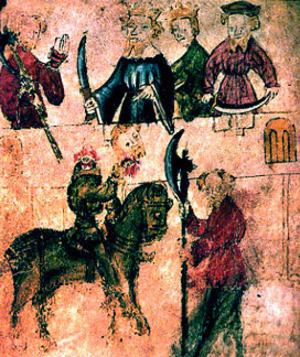Last night I went to a reading-plus-talk about the translation of the epic Old English poem Sir Gawain and the Green Knight, by Simon Armitage. For various reasons (you can check the poem of the day at his website if you want to find them) Simon Armitage is my favourite living poet so I could not past up this opportinity to see him read his work live for the first time. I knew nothing about the Swedenborg Society when I arrived at their House in Bloomsbury, nothing about Emanuel Swedenborg, inventor and philosopher of the 18th century. But it was a prettily put event; Armitage not only read from his world-famous translation of Gawain and answered the audience questions but he also talked about the themes in the poem and showed us a bit of the documentary he made for BBC4 about it.
Gawain is a gorgeous poem and Armitage's translation (my introduction to the poem, actually, a couple of years ago) keeps the music of the original Middle-English language, it's a piece full of alliterations and wonderful noise. Armitage insisted in the connection of the poem with nature, the way the language and landscape are entwined. This is particularly interesting for a poet like Armitage, self-confessed Ted Hughes admirer and a worthy heir of England's best nature poet. It is also the most interesting aspect of the translation for me, as well; how the landscape needs to influence the language of your work, specially if you are dealing with a historical period (Gawain was probably written around 1400) where people were more in contact with raw nature on a daily basis than we are now in our technological and man-made society. The writing has to reflect the sound and rhythm of the story's landscapes and that's what Armitage excels at in this translation. That and a very peculiar sense of humour, perfectly fit to the playful original. Armitage confessed to being drawn to the topography of the poem because it's very likely that the original author came from the same area as Armitage comes from, a frontier-land in the south Pennines - somewhere between Cheshire, Derbyshire, Staffordshire and Lancashire.
Gawain is a great mystery - written by a someone contemporary of Chaucer but with a very different language, a whole other dialect indeed, the poem catches the excitement of the English language starting to come together, come alive. We don't know who wrote Sir Gawain and the Green Knight and we might never find out. Simon Armitage, at least, declared his hopes that we should never resolve the riddle of this anonymous author. He'd like to live with the mystery intact.
This is one of my favourite passages, when the Green Knight gets his head chopped off at the Court of King Arthur, but remains alive and well nonetheless:
In the standing position he prepared to be struck,
bent forward, revealing a flash of green flesh
as he heaped his hair to the crown of his head,
the nape of his neck now naked and ready.
Gawain grips the axe and heaves it heavenwards,
plants his left foot firmly on the floor in front,
then swings it swiftly towards the bare skin.
The cleanness of the strike cleaved the spinal cord
and parted the fat and the flesh so far
that that bright steel blade took a bite from the floor.
The handsome head tumbles onto the earth
and the king's men kick it as it clatters past.
Blood gutters brightly against his green gown,
yet the man doesn't shudder or stagger or sink
but trudges towards them on those tree-trunk legs
and rummages around, reaches at their feet
and cops hold of his head and hoists it high,
and strides to his steed, snatches the bridle,
steps into the stirrup and swings into the saddle
still gripping his head by a handful of hair.
Then he settles himself in his seat with the ease
of a man unmarked, never mind being minus
his head!
And when he wheeled about
his bloody neck still bled.
His point was proved. The court
was deadened now with dread.



No comments:
Post a Comment